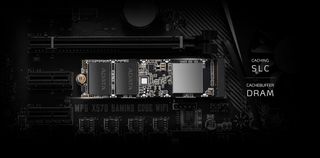Adata XPG SX8100 M.2 SSD Features PCIe 3.0 x4, SLC and DRAM Caching
Adata has launched a new M.2 SSD in the SX8100. The drive is based on the PCIe Gen 3 x4 and NVMe standards with read and write speeds listed up to 3500/3000 MBps and 300K/240K IOPS, respectively. The drive uses 3D NAND flash, SLC caching and a DRAM cache buffer to help reach those speeds. The SX8100 comes in a 2280 size form factor, up to a 2TB capacity and supports the latest Intel and AMD platforms.

The 3D NAND includes data protection and correction technologies said to increase TBW (total bytes written). This includes LDPC (low-density parity-check) error correcting code technology, which today's announcement said detects and fixes a wider range of data errors. There is also E2E (End-to-End) data protection and RAID Engine to help ensure security, integrity and durability of the device.
To that end, the SX8100 is backed by a 5-year warranty with a 2,000,000 hour MTBF rating. In TBW, that yields to 320/640/1280 TBW for the 512GB, 1TB and 2TB SSDs, respectively. Most users will be hard-pressed to eclipse those values in normal use scenarios.

In the past, Adata has used mostly SMI controllers, and while one wasn't mentioned in Adata's announcement, there is speculation they used a Realtek controller for this unit. Also not listed is the amount of DRAM on board (we suspect it is less than, slower, or both compared to the SX8200). We've reached out to Adata to get get some clarity and will update the article if we hear back.
Neither pricing nor availability were listed, but we expect to see these soon.
Image Credit: Adata
Stay on the Cutting Edge
Join the experts who read Tom's Hardware for the inside track on enthusiast PC tech news — and have for over 25 years. We'll send breaking news and in-depth reviews of CPUs, GPUs, AI, maker hardware and more straight to your inbox.

Joe Shields is a Freelance writer for Tom’s Hardware US. He reviews motherboards.
-
bit_user Wow, this thing ticks all the boxes, for me. If pricing is competitive with other high-end consumer NVMe drives, I'll seriously consider it.Reply
Recently, I was having a serious think about Intel's 760p. The main downside being its lackluster performance, but the main upside being its end-to-end data protection and its price. If this can deliver on the first two, I'd be willing to pay a fair bit more.
Most Popular


